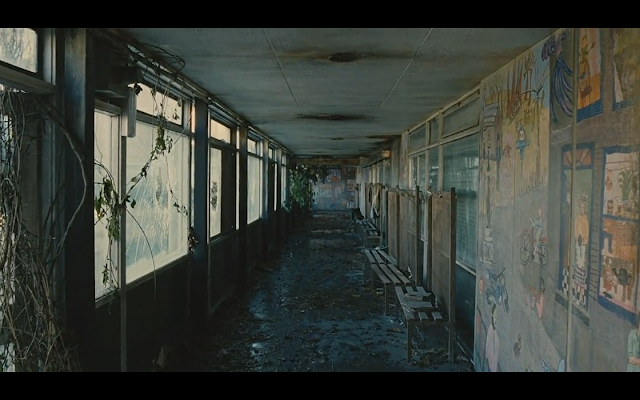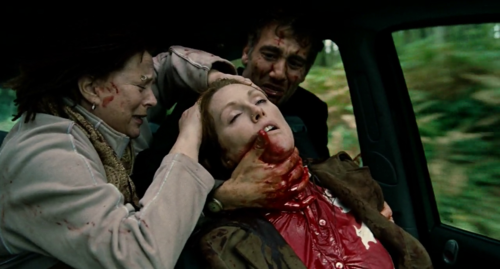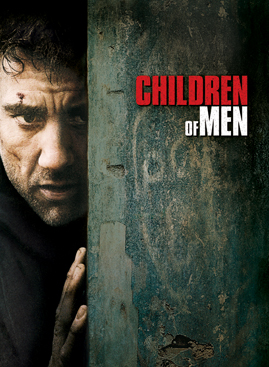 |
| Movie poster for Children of Men |
Children of Men immediately draws critical attention to this futuristic declining world’s tendency to turn women and children into symbols. The opening scene shows droves of people mourning the death of the youngest person in much the same way that celebrity deaths are mourned, setting up the 18-year-old man as a symbol of youth and a reminder of humanity’s impending extinction. The activist immigrant rights group, the Fishes, sees young pregnant Kee (portrayed by Clare-Hope Ashitey) as a symbol. She is not only a West African immigrant, but also the only woman to become pregnant in 18 years. She is a symbol of the humanity of immigrants, the salvation of the human race itself, and of a coming revolution. It is also made clear that women are forced to submit to fertility tests or face imprisonment, rendering these survivors little more than failed symbols of reproduction and shamed symbols of infertility. Though the film overtly critiques this desire to turn human beings into symbols, it indulges in it quite a bit.
The scene in the abandoned school is pregnant (pun intended) with symbolism.
 |
| “As the sound of the playgrounds faded, the despair set in.” – Miriam |
As the young Kee sits alone on a rickety swing set, the camera pans the dilapidated building and Miriam recounts her experiences as a medical midwife at the beginning of the pandemic. The scene mourns imaginary children who never existed along with an imaginary future that proves likewise illusory. The empty school reinforces the crushing absence of children, which in turn represents the absence of a future.
The film apparently resists turning pregnant Kee into a symbol by showing that the only sane response to her pregnancy is that of Theo’s overwhelming desire to get her to a doctor so that she can receive necessary medical attention. However, when Kee reveals the fullness of her pregnant stomach to Theo, it is nothing but indulgent symbolism. She takes her shirt off in the middle of a barn full of cows, her posture of one hand covering her breasts and the other cupping her belly simultaneously one of modesty and fecundity.
 |
| Kee is dehumanized and symbolized |
This image of the pregnant black woman amongst livestock paired with the swelling music that evokes apotheosis is particularly offensive to me. Her humanity is transcended into grotesque female-coded symbols like earth, goddess, fertility, and nature. Her blackness is racistly used to reinforce the nature symbolism as well as the birth and beginning of mankind. The deliberateness of these symbols is even more apparent when the original PD James text The Children of Men is considered in which Julian (played by middle-aged white Julianne Moore) was the character with the mystical pregnancy. Though it is impossible to not read some symbolism into Kee’s pregnancy, her “revelation” scene is exploitative and is done dramatically and specifically to benefit the male viewer in the form of Theo.
 |
| The unsavory Marichka driving Theo & Kee to a filthy room for the night |
Julian, though a strong woman, is too often shown from Theo’s perspective as the beautiful, unattainable bitter ex-wife and forever mourning ex-mother. Not only that, but she dies suddenly very early on in the film. Her death itself is the most important thing about her because it’s an inside job, showing that the so-called immigrant rights activist group has questionable morality and can be trusted no more than the oppressive government regime. Therefore, Julian’s death is highly symbolic and paradigm shifting.
 |
| The Fishes scorn Julian’s non-violent methodology and murder her in order to exploit Kee’s baby as a symbol for revolution. |
Not only were there few representations of non-symbolic women, but the entire film, a film about fertility, motherhood, and childbirth, is told from the perspective of a man. The most flagrant example of a marginalized female character is Kee. She is a child herself with no true agency, who knows nothing of pregnancy and motherhood, who must rely on the experience and protection of Theo. Kee’s lack of agency and complete reliance on Theo set up yet another patriarchal iteration of genesis wherein the rebirth of the human race isn’t due to Kee and her baby girl, Dylan; it’s due to the perseverance of a lone man whose ideals may be jaded, but he feels compelled to “do the right thing” no matter what noble sacrifices it might require.
 |
| Theo sacrifices his own life to protect Kee and her baby, ensuring they make it to safety first |
Not only is Theo the martyr and savior of this film, but he knows more about motherhood than Kee does. He delivers the baby, coaching Kee on how to breathe and push, motivating her when she is overcome. He then delivers Kee and her baby to the so-called safety of The Human Project (a secretive group purporting to be searching for an infertility cure).
| Kee’s pregnant body is turned into an icon. |
Children of Men‘s depiction of women as props, tools, symbols, or cardboard underscores the notion that women’s true purpose is reproduction, and when women can’t reproduce, they’re not only useless, but society itself collapses under the burden of their neglect of duty. Despite many of the intriguing themes this film explores (including a scathing denouncement of the treatment of immigrants), Children of Men ends up falling in line with its mainstream contemporaries to assert that women are merely bodies, that a woman’s value lies in her ability to reproduce, and that she has and should have no control over that body or that ability to reproduce.

I agree. I had high hopes for this movie (silly me) that collapsed almost as soon as the movie began.
Thanks for this insightful reading. In my initial admiration of the film’s fruitful explorations of immigration, terrorism, privilege/context with regard to art, and the function of green- and red-zones, I rather missed (or refused to see) the now plainly reductionist gender (and race) politics present there. The scene of Kee among the livestock in particular should have been a red flag.
I really liked Children of Men, and I agree with the character of Kee being underdeveloped. Her immidiate trust in Theo doesn’t make a whole lot of sense, and her lack of dialogue is a little troubling. Though, I’m not sure I agree with your analysis. It is not just the women who are reduced in this movie – the entire human race is reduced to pointless desperate violent creatures. No life is worth anything – except that of the unborn child’s. Kee is only a vessel, a symbol, a body – yes. Though, the men (and other women) in this movie aren’t even that. By this time in the dystopian story, no-one is anything anymore, they have no worth or function at all. Theo’s only point is to get Kee and her unborn to “safety”. He isn’t a hero, he isn’t anything – but this last task that is put upon him.
Although I understand many of the arguments made in this post, you have missed several key points. For starters in the scene where Kee is among the livestock, this is actually a reference to the Nativity story told in the bible, where another “miracle baby” is present. Also you have said that the character of Marichka is crazy, thus de-valuing women. Where in actual fact she portrays heroic traits when she immediately risks her own life and attacks the deranged Sid who is trying to take Kee’s baby. She fought a man with a gun to protect 2 people she had only met for less than an hour. She also stays behind when there is not enough room to escape on the boat, making her a martyr also.
Julian is only shown through Theo’s views on her as the entire narrative film is shown through his point of view. The only scene which is omniscient is the scene where Jaspar euthanises his wife and dog. And Miriam may be a “hippy” with her alternative medicine, but so is Jaspar.
In regards to the change from the book in which the men were the infertile ones, this was done to make the story more believable. If the men were the infertile ones then Kee’s pregnancy would not have been as important. It would have been more crucial to find the father and have him begin repopulating. By changing it for the film it adds emphasis to the importance of Kee’s pregnancy and no thought is given to the father as Kee mentions that she doesn’t even know who he is.
And finally the film follows Theo rather than Kee because he is the protagonist, and it makes sense for this to be so. The story needs to follow a character arc and maintain a storyline. If Kee were the main character the story would be “This is a world where there are no kids, this is Kee, she discovers she is pregnant, 9 months of her being messed about by the fishes, she makes it to the human project”. The whole story of the film takes less than a week and that simply wouldn’t be possible with Kee as the main character. Instead we are introduced to the drunken, depressed character of Theo who is pulled away from his life and is suddenly forced to act under pressure and help these people who he barely knows.
And of course Theo is telling Kee what to do during the birthing scene. With Miriam gone and Kee never having even seen a pregnant women before he is the only one to aid her. Remember that he has experience given that he had a son in the past.
lol you feminazis sure like to whine! sure hate men too!
Oh boy, another knuckle dragger comments…..
I agree with a lot of your points, especially how they made Kee so helpless, though I appreciated that the salvation of humanity was a black woman. I haven’t read the book so I can’t compare, but in thinking about the infertility question (men in the book, women in the movie), it does occur to me that female infertility is actually far more desperate (extinction-wise) than male. After all, if women can still bear children, then if they could find only one man with healthy sperm, or even some way to clone sperm, extinction problem solved. But if women can’t conceive or gestate, all the working sperm in the world are useless, from a population standpoint. And if you have only one fertile woman, you still have a big population problem. So for story purposes, making it female infertility ratchets up the drama.
Thank you for this very important analysis. I personally love the film but I had to look up the way this film deals with gender and race to get the critical ideas not offered in mainstream reviews. Children of Men offers many interesting ideas that may not have centered on dehumanization of female bodies but many important themes still relied on this dehumanization. I had to ask myself during the film why Theo was so central as a character and so important to Kee. Some reviews say he grows morally from downer bureaucrat to life-risker for the sake of humanity. But your points make me realize that Theo was most important for his male agency and male gaze. I thought it was a revolutionary idea that the savior of the world (or saviors as Kee and Dylan) is female but then I remembered Dylan had to be female. Only Dylan can inherit Kee’s fertility.
one of my favourite movies. excellent article.
Kinda reads like you’re pulling at straws. The men in this movie were mostly ridiculous or hostile, Theo knows more about taking care of a baby because he actually had one, the movie is told from a man’s perspective because it’s made by a man (it isn’t unheard of for a man to tell a story from a woman’s perspective, but it’s rather unusual and awkward), and symbolic fertility visuals work a lot better with pregnant women than they do with pregnant men.
In addition, I don’t think this movie has any truly complex, fleshed-out characters; however, the movie’s female characters get a lot closer to it than the male ones do.
Yes it would be way better if men were to blame instead of women. Why is that? It matters not which gender is sterile as both are needed.
Thank you for this (wish I’d seen it years ago). Glad to see I’m not the only one who had issues with Children of Men. On top of the problematic and stereotyped treatment of its characters (of both sexes, I would argue (because do you get it? Tory Boy Michael Caine’s a whacky old hippie!) the film also strips the interesting science fiction concept of its own notable characteristics to score cheap political points instead. I despise W Bush’s administration as much as the next sane human, but the Guantanamo Bay and Iraq War imagery is completely unexplained and nonsensical in a world collapsing because of population decrease. Children of Men is a nihilistic, adolescent thesis on humanity noteworthy only because of that one long uncut shot in the car.